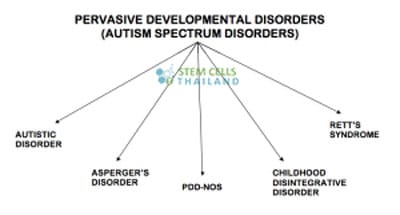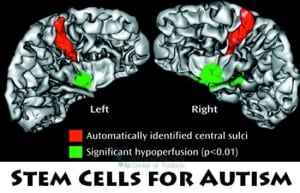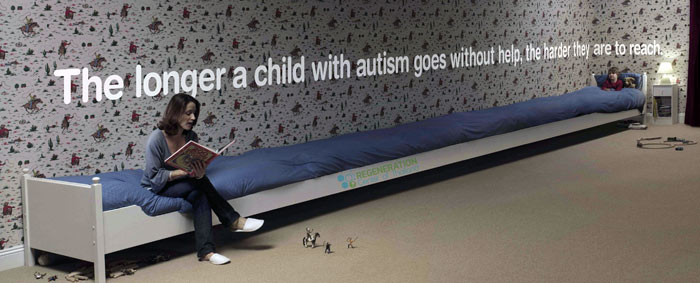Autism Spectrum Disorders are recognized internationally as complicated developmental disabilities. Specialists think that Autism Spectrum Disorders present themselves during the first few years of an individual’s existence. The condition is an outcome of a neurological disorder which has an impact on the regular brain function, affecting the development of the person’s communication and social interaction abilities.
A wide range of social interactions and activities which includes a component of play and/or banter, plus non-verbal communication are the usual problems of individuals with autism.
Treating Autism – VIDEO
ASD stands for Autism Spectrum Disorder and may occasionally be called “Autistic Spectrum Disorder”. ASD and Autism mean exactly the same. Any developmental disabilities which is caused by a brain abnormality is considered ASD. An individual/child suffering from ASD usually has problems with socializing and he/she may have speech and language difficulties. An individual with ASD will usually also favors to stick to a set of behaviors and can resist any significant (or numerous minor) modifications to day-to-day activities.
What are Stem Cells?
Stem cells are primordial cells that may divide and differentiate into any and every other cell in the human body. This differentiation is often into much more specialized cells inside your body. The 2 main kinds of stem cells are
- Embryonic stem cells
- Adult stem cells including dental pulp, adipose tissue and cord blood cells
Why Autistic Kids Respond To Stem Cells
Kids with autism suffer from two significant dysfunctions:
- Hypoperfusion.
- Immune Dysregulation.
Hypo-perfusion is basically decreased blood flow towards the brain, which means that the brain doesn’t obtain sufficient oxygen and can’t function in the normal way. If there is not sufficient blood flowing towards the brain, then the resulting outcome causes the brain cells to get swollen and producing more nitric oxide. This in turn, breaks the cells to obtain an excessive amount of calcium, and this consequently damages the mitochondria (responsible for the power of cells).
Consequently, the brain cells are affected by the lack of food which lead to death of brain cells.

Immune dysregulation in kids with autism indicates that their immune systems don’t respond in a usual manner to stimulation. When the physical body signals towards the immune system that it currently need some help, (like when the brain becomes inflamed) the correct immune response and subsequent healing don’t happen in kids with autism. Rather, kids with autism frequently suffer from the autoimmune responses, some chronic inflammation, and they have incessantly suppressed immune systems.
The autoimmune response such as inflammatory bowel disease occurs when the body automatically attacks the big cells because they do not recognize your own body cells. Autoimmune disorders such as MS, Crohn’s and autism. The Immune dysregulation is an extremely apparent condition within the gastrointestinal well being of kids with autism. Most kids and patients suffer from signs and symptoms ranging from mild gas, diarrhea, inflammation of gastrointestinal systems, and lastly, bloating of the intestinal lesions.

Two types of the stem cells are especially helpful in relieving Autism and the immune dysregulation and hypo-perfusion which are the characteristic of kids with autism. Reversing hypoxia helps in the activation of the self-repair mechanisms. This neural proliferation is noticed after reperfusion in cases with cerebral ischemia.
Nevertheless, to our understanding, in order to stimulate angiogenesis (New blood vessels), the utilization of stem cells is now commonly used by many for treating autism. Adult Stem Cells have already been proven to be very safe, efficient and effective in treating children suffering with Autism.[1]
Our doctors understand the benefits of functional healthcare that includes Autologous blood stem cells,dental pulp derived stem cells and fat derived stem cells to effectively help the proliferation of angiogenesis in numerous models of ischemia.[2]
Reverse Autism Spectrum Disorder
The CD11b+, CD34+ fraction, that is roughly lesser than half of cord blood stem cell CD34+ was shown and demonstrated to acquire the capability to specialize into the endothelial cells. CD34+, VEGF-R3+ cells illustrated the capability to specialize into endothelial cells and had been in a position to extend into 40-fold expansion. Blood stem cells are usually adequate to induce neuroregeneration. We recommend that this kind of stem cell might be very helpful for the treatment of autism given the effectiveness of the cord blood CD34+ cells in inducing homing and angiogenesis in locations of cerebral hypoperfusion.[3]
Cell Therapy for Treating Autism Spectrum Disorders
PRIVATE TRIAL PHASE ONLY
The Regen Center and its partners are currently conducting private trials for Autism and are not currently accepting new participants until March of 2025.Published Clinical Citations
[1] ^ Arber, Charles, and Meng Li. 2013. Cortical interneurons from human pluripotent stem cells: prospects for neurological and psychiatric disease. Frontiers in cellular neuroscience (March 13). doi:10.3389/fncel.2013.00010. https://www.ncbi.nlm.nih.gov/pubmed/23493959
[2] ^ Mikhailov, Anna, Alanna Fennell, Oradawan Plong-on, Thanya Sripo, Tippawan Hansakunachai, Rawiwan Roongpraiwan, Tasnawat Sombuntham, Nichara Ruangdaraganon, John B Vincent, and Pornprot Limprasert. 2014. Screening of NLGN3 and NLGN4X genes in Thai children with autism spectrum disorder. Psychiatric genetics, no. 1. doi:10.1097/YPG.0000000000000019. https://www.ncbi.nlm.nih.gov/pubmed/24362370
[3] ^ Arber, Charles, and Meng Li. 2013. Cortical interneurons from human pluripotent stem cells: prospects for neurological and psychiatric disease. Frontiers in cellular neuroscience (March 13). doi:10.3389/fncel.2013.00010. https://www.ncbi.nlm.nih.gov/pubmed/23493959

